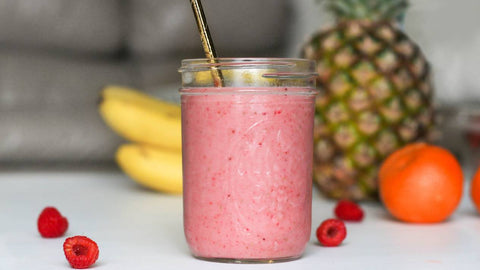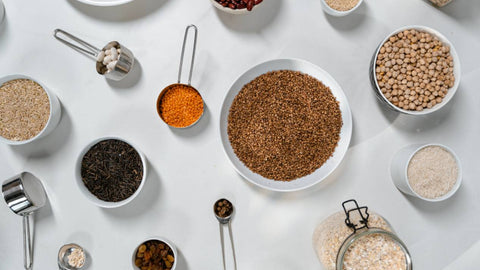Why it's important to make changes to your diet and lifestyle before you fall pregnant!
A lot of women know how important it is to eat well during pregnancy, but what a lot of them don’t know is how important it is in the months leading up to pregnancy! With roughly 50% of pregnancies being unplanned, now is the perfect time to be working on developing some healthy habits. Not only will this increase your chances of falling pregnant and having a healthy pregnancy, but it can even affect your future baby’s health and risk of allergies.
While it is true that women are born with all their eggs, the three months leading up to conception (i.e. the sperm reaching the egg and becoming a baby) is an important time as the egg cells are developing and maturing. It's also important to mention men here too as they are 50% of the equation and it takes two to tango. What a man eats and drinks can also impact fertility as it takes around 60 days for sperm to develop. How healthy the egg and sperm are ultimately affects the baby’s DNA.
The top changes we would recommend in the three to six months prior to conception are:
- Aim to be your healthiest weight: Although weight isn’t the only factor that's important for a healthy pregnancy, being underweight or overweight can reduce your fertility. Excess body fat can reduce sperm and egg quality and therefore your fertility. Did you know maintaining a healthy body weight in the 12 months leading up to conception reduces the likelihood of your child being outside of the health weight range later in life? Being overweight can also increase your risk of developing gestational diabetes and preterm birth.
- Start taking a prenatal supplement: This should be catered to your individual needs and prescribed by a medical professional such as a qualified women’s health dietitian. The two non-negotiables are a supplement containing at least 400ug of folic acid and 150ug of iodine. Some women will require additional folic acid depending on their medical history and weight. This should be taken for at least three months before falling pregnant and throughout the pregnancy too. A range of other nutrients may be required to supplement such as omega-3 fatty acids, vitamin D, iron and vitamin B12, which is why getting some prenatal blood work can be beneficial.
-
 Include oily fish 2-3x/wk: Aim for two serves of low-mercury fish per week such as salmon and trout. Oily fish is rich in omega-3 fatty acids which are important for reducing inflammation around our reproductive organs, forming the building blocks of sperm cells and improving female fertility. Regular consumption of oily fish has been linked with a shorter length of time to pregnancy in couples who are trying to conceive. The omega three fats in these oily fish seem to have many benefits in promoting fertility, such as enhancing sperm quality in men, contributing to healthy egg development, reducing inflammation and regulating menstrual cycles in women with polycystic ovary syndrome (PCOS). Include fish such as salmon, sardines, trout and mackerel. Other sources include chia seeds, flaxseeds and walnuts.
Include oily fish 2-3x/wk: Aim for two serves of low-mercury fish per week such as salmon and trout. Oily fish is rich in omega-3 fatty acids which are important for reducing inflammation around our reproductive organs, forming the building blocks of sperm cells and improving female fertility. Regular consumption of oily fish has been linked with a shorter length of time to pregnancy in couples who are trying to conceive. The omega three fats in these oily fish seem to have many benefits in promoting fertility, such as enhancing sperm quality in men, contributing to healthy egg development, reducing inflammation and regulating menstrual cycles in women with polycystic ovary syndrome (PCOS). Include fish such as salmon, sardines, trout and mackerel. Other sources include chia seeds, flaxseeds and walnuts.
- Eat the rainbow: One of the best ways to boost your antioxidant intake is to eat the rainbow which means including a variety of colourful fruit and veg daily. Antioxidants help to protect our reproductive organs from damage and inflammation. Other sources of antioxidants include herbs, spices, extra-virgin olive oil, wholegrains and legumes. Antioxidants are often found in fruits and veggies, with each different colour generally indicating a different type of antioxidant. Very few Australians meet the intake targets for fruit and vegetables, so make an extra effort to actually get your two serves of fruit and five serves of veg every day. Let every meal be an opportunity for getting in some veggies (not just adding them as an after-thought) and keep your fruit bowl topped up with fresh, seasonal fruit.
Need some inspiration?
- Add mushrooms, sauteed tomatoes and wilted spinach to an egg on toast
- Add fresh berries to your morning muesli
- Snack on chopped veggie sticks with hummus
- Choose meals that champion veggies more often, such as stir fries, bulked up salads or Mexican meals with plenty of fresh veg
- Swap some animal protein for plant-protein: Harvard University researchers have found that higher intakes of animal protein can be associated with infertility compared to people who have a higher intake of plant-based protein. This doesn’t mean it’s necessary to give up meat altogether - in fact, for people who include meat in their diets, consuming a small portion of lean red meat 1-2 times per week provides several essential nutrients, such as iron, zinc and CoQ10. Simply start by swapping out a meat meal or two per week for plant based proteins, or even swapping half of the meat in your meal for legumes or other plant proteins. Even swapping just 25g of animal protein per day with plant-protein is enough to boost your chances of conceiving! Choose plant based protein sources such as lentils, chickpeas, tofu, pulse pasta or kidney beans and get creative with your cooking such as making black bean burritos, chickpea patties, a tofu stir-fry or lentil bolognese.
- Avoid alcohol: It is not uncommon for Australian adults to drink in excess of what is considered safe or healthy. Drinking alcohol increases the time it takes to get pregnant and can affect a baby’s health and development. It can also reduce a male’s sex drive and affect sperm quality. If you are planning a pregnancy, cutting back or avoiding alcohol is the safest option.
- Cut back on refined carbohydrates, added sugars and saturated fats Low GI carbohydrates give the body a slow and gradual rise in blood sugar and insulin levels. A low diet can improve fertility by improving blood sugar and insulin levels. Examples of lower GI foods include pasta, quinoa, buckwheat, rice vermicelli noodles, sweet potato, sourdough or seeded bread, rolled oats, most fruit and yoghurt. Take steps to cut back on refined sugars in baked goods and sugar-sweetened beverages. Just one can of soft-drink per day can reduce your chances of falling pregnant by up to 25%. Diet rich in saturated fats from deep-fried foods, takeaway foods and processed meats are associated with reduced fertility.
Investing in your nutrition and supplement is a GIANT positive step towards increasing your chances of falling pregnant, having a healthy pregnancy and giving your baby the best chance at a healthy life. Planning on trying for a baby in the near future? Book in with one of the women’s health dietitians at Eatsense.
Eatsense Dietitians - Erina | West Gosford | Wyong | Saratoga | Kariong | Umina | Telehealth


